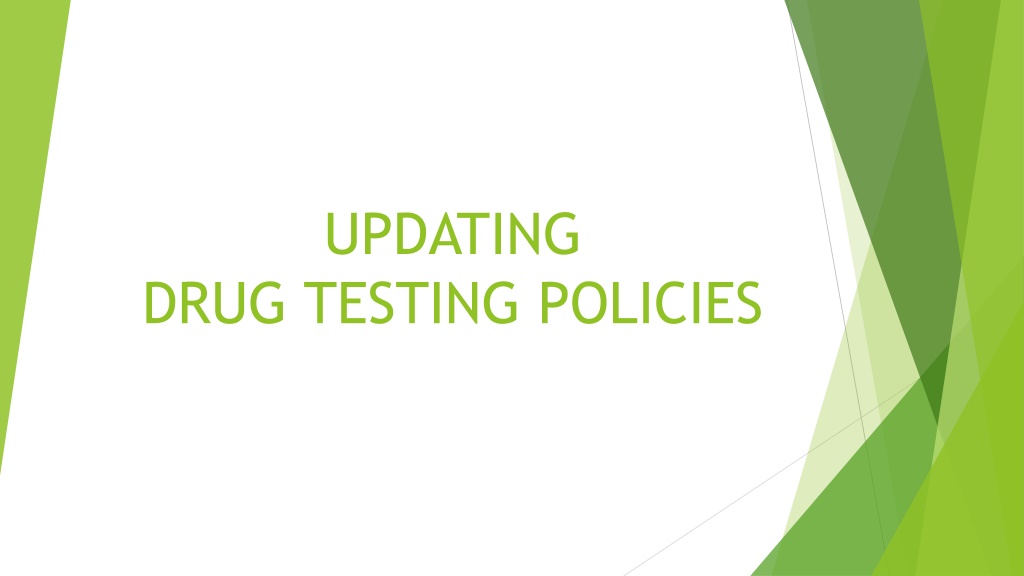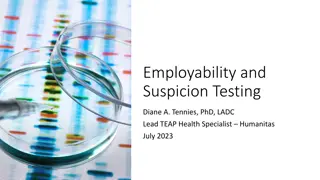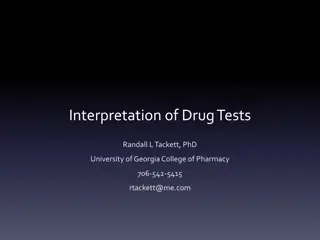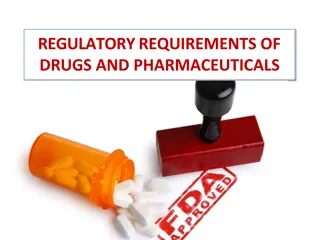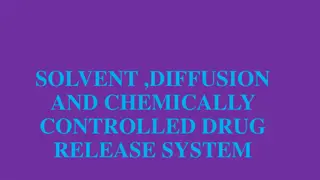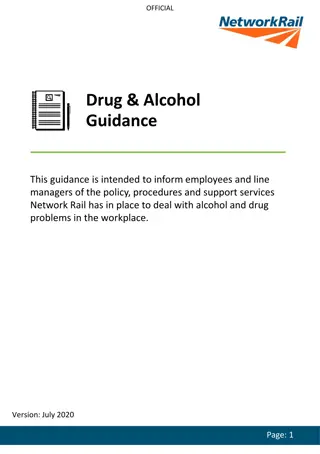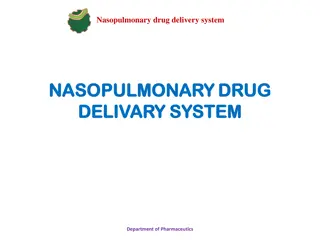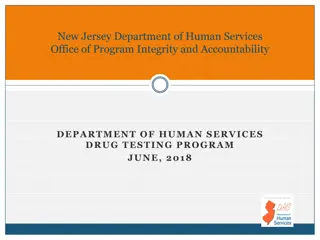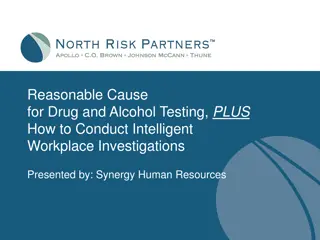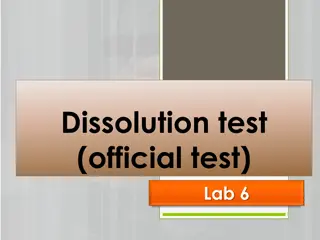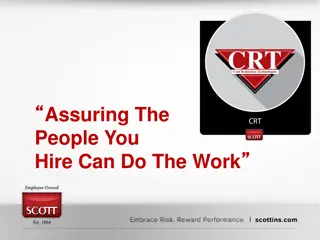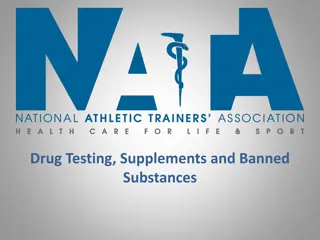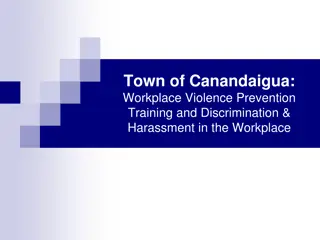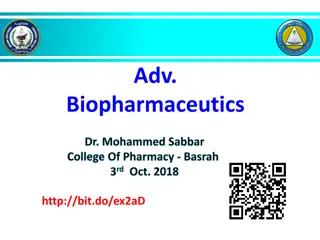Understanding Drug Testing Policies in the Workplace
The Drug-Free Workplace Act of 1988 mandates federal grant recipients to implement zero-tolerance drug policies to maintain a drug-free environment. Employers must establish clear policies, conduct awareness programs, offer counseling and rehabilitation services, and impose penalties for violations. The act also outlines requirements for reporting drug convictions and maintaining a drug-free workplace. Additionally, considerations under the Fourth Amendment provide guidelines for public employers conducting drug testing. Explicit protections under Act 593 of 2017 prohibit discrimination based on participation in medical marijuana programs. Various legal clauses such as the Due Process Clause and the Civil Rights Act protect employee rights in the context of drug testing policies and practices.
- Workplace drug testing
- Drug-Free Workplace Act
- Fourth Amendment
- Employee protections
- Legal considerations
Download Presentation

Please find below an Image/Link to download the presentation.
The content on the website is provided AS IS for your information and personal use only. It may not be sold, licensed, or shared on other websites without obtaining consent from the author. Download presentation by click this link. If you encounter any issues during the download, it is possible that the publisher has removed the file from their server.
E N D
Presentation Transcript
UPDATING DRUG TESTING POLICIES
DRUG FREE WORKPLACE ACT The Drug Free Workplace Act of 1988 requires all federal grant recipients to establish and enforce zero tolerance drug policies. Any employer that fails to adhere to the requirements of the Drug Free Workplace Act risks payments for grant activities being suspended, the whole grant being suspended or terminated, or the grantee being prohibited from receiving any federal grants for up to five years. Requirements of Drug Free Workplace Act Publish and give a policy statement informing all employees that the unlawful manufacture, distribution, or possession or use of a controlled substance is prohibited in the workplace and specify the consequences for violation of the policy. Establish a drug-free awareness program- inform employees of the dangers of drug abuse; the policy maintaining a drug- free workplace; the availability of drug counseling, rehabilitation, and employee assistance programs (EAP); and the penalties that may be imposed for drug abuse violations. Employees must notice their employer within 5 calendar days if convicted of a criminal drug violation in the workplace. Within 10 days after receiving notice that an employee has been convicted, the employer must notify the granting agency. Employer must impose a penalty on, or require participation in a drug abuse assistance or rehabilitation program, any employee that is convicted of a reportable workplace drug conviction. Must make a good faith effort to maintain a drug-free workplace by meeting the requirements of the Act.
Fourth Amendment Considerations for Public Employers Drug testing is considered a search according to the 4thAmendment Each test must pass a balancing test. Skinner v. Railway Labor Executives Assn. & National Treasury Employees v. Von Raab Their must be a compelling governmental interest that outweighs the intrusion of the employee s privacy. Employee testing groups must be narrowly tailored to the governmental interest Must first determine why it is necessary to test each particular group Is there a documented drug or alcohol problem in a particular work group? Is the group performing duties that are fraught with such risks of injury to others that even a momentary laps of attention can have disastrous consequences ? Examples where the US Supreme Court has found compelling governmental interests Train operators Nuclear power plant operators Customs agents who are directly involved in drug interdiction and/or carry firearms
Explicit Employee Protections of Act 593 of 2017 Anti-discrimination provisions prohibit all adverse employment actions against employees based solely on participation in medical marijuana program Require a showing of impairment before taking adverse employment action OTHER CONSIDERATIONS: Due Process Clause and Equal Protection Clause Americans with Disabilities Act Does not protect employees engaging in current illegal use of drugs Arkansas Civil Right Act Protects against discrimination on the basis of disability in the workplace
Types of Testing Job Applicants/Pre-employment Employees who are reasonably suspected to be impaired as a result of drug or alcohol use Random Employees involved in an accident or incident Return to duty Follow-up
Types of Testing Pre-employment Testing Preformed after a conditional offer of employment has been made Wholesale testing of applicants for government employment without regard to the nature of the position has not been up upheld. Chandler v. Miller Pre-employment testing should be used only for applicants who will occupy Department of Transportation/Federal Motor Carrier Safety Administration s covered positions and safety sensitive positions Reasonable Suspicion Testing Reasonable suspicion testing must be based upon individualized suspicion of on-duty drug use or impairment, which is documented by a trained supervisor Uncorroborated tips and hunches are not enough Post Accident Testing Must be specific about who must be tested Testing is overbroad when it includes all employees in a vehicle, even those whom the facts indicated could not have caused the accident. Plane v. United States Setting a policy with a limit on damages, such as in excess of $1,000, may be difficult to administer and may be determined by a court to be of an insufficient magnitude to provide probable cause to search. Connelly v. Newman
Types of Testing Random Testing It acts as a deterrent because employees know they will be tested, but they do not know when Must be a position that constitutes a sufficient public safety concern, such as operating heavy machinery Has been upheld when there is front-line drug interdiction, carrying a firearm, and sensitive classified information affecting national security Courts have been reluctant to allow for driving a vehicle where no passengers are involved, such as mail carriers or messengers. AFGE v. Sullivan At least one Court ruled that operating a passenger motor vehicle was no greater risk than everyone runs when driving a car. National Treasury Employees Union v. Watkins Mostly allowed when driving vehicles other than passenger cars and/or carrying significant number of passengers Certified law enforcement carrying weapons & working in drug interdiction, 911 operators, jail deputies with direct contact with prisoners, mechanics, road and bridge crews, sanitation crews, CDL holders mandated by DOT & FMCSA (Federal Motor Carrier Safety Administration) regulations Return to Duty Testing & Follow-up Testing Required by DOT/FMCSA Good idea to limit substance abuse and ensure an unimpaired workforce
Arkansas Medical Marijuana Amendment In order to take adverse employment action, the employer must have proof of the employee s public/workplace use OR proof of being under the influence.
SAFETY SENSTIVE POSITIONS as Defined by Act 593 of 2017 Any position involving a safety sensitive function pursuant to federal regulations governing drug and alcohol testing adopted by the US DOT or another federal agency Also means any position designated in writing by an employer as a safety sensitive position in which a person performing the position while under the influence of marijuana may constitute a threat to health or safety, including without limitation: (i) a position that requires: (1)carrying a firearm; (2) performing life-threatening procedures; (3) working with confidential information or documents pertaining to criminal investigations; (4) working with hazardous or flammable material; controlled substances, food, or medicine; or (ii) in which the lapse of attention could result in injury illness, or death, including without limitation a position that includes the operating, repairing, maintaining, or monitoring of heavy equipment, machinery, aircraft, motorized watercraft, or motor vehicles as part of the job duties.
Symptoms Causing a REASONABLE SUSPICION of being UNDER THE INFLUENCE as Defined by Act 593 of 2017 Under the Influence means symptoms of the current use of marijuana that may negatively impact the performance of the job duties or tasks or constitute a threat to health or safety and includes without limitation: (i) symptoms of the applicant s or employee s speech, walking, standing, physical dexterity, agility, coordination, actions, movement, demeanor, appearance, clothing, odor, or other irrational or unusual behavior that are inconsistent with the usual conduct of the applicant or employee; (ii) negligence or carelessness in operating equipment, machinery or production or manufacturing processes; (iii) disregard for safety; (iv) involvement in an accident that results in: (a) damage to equipment, machinery, or property; (b) disruption of a production or manufacturing process; or (c) an injury; or (v) other symptoms causing a REASONABLE SUSPICION that the current use of marijuana may negatively impact the performance of the job duties or tasks or constitute a threat to health or safety.
Proof of Current Use of Marijuana Justifies the GOOD FAITH BELIEF of Employer Pursuant to Act 593 of 2017 Good Faith means reasonable reliance on a fact without the intent to deceive or be deceived and without reckless or malicious disregard for the truth. May be based on the following: 1. observed conduct, behavior, or appearance; 2. information reported by a person believed to be reliable, including without limitation a report by a person who witnessed the use or possession of marijuana or paraphernalia by an applicant or employee in the workplace; 3. written, electronic or verbal statements from the employee or other persons; 4. lawful video surveillance; 5. a record of government agencies, law enforcement agencies, or courts; 6. a positive test result for marijuana; 7. a warning label, usage standard, or other printed material that accompany instructions for usable marijuana; 8. information from a physician, medical review officer, or a dispensary; 9. information from reputable reference sources in print or on the internet; 10. other information reasonably believed to be reliable or accurate.
Actions That Will Not Constitute a Cause of Action A cause of action may not be established against an employer for: Establishing a substance abuse or drug free workplace policy Acting on the employer s good faith belief that a qualifying patient either possessed, used, or was under the influence of marijuana while on the premises of the employer or during working hours, as long as a positive test result for marijuana was not the sole basis for the good faith belief Excluding a qualifying patient from being employed in or performing a safety sensitive position based on the good faith belief that the qualifying patient was engaged in the current use of marijuana.
How to Document Reasonable Suspicion 1. Receiving Complaints- Often concerns come from co-workers. Do not want to send an employee for testing based on hearsay or gossip, but a supervisor should document the complaint/concern. Ask what was observed, when it was observed, and if others witnessed it and document it. 2. Observation by Supervisor- Immediately upon notice, a supervisor should go to the employee s work area for first hand observation. May be able to observe from afar, but will meet to talk to employee directly to observe smell of alcohol, eye dilation, slurred speech and/or other behaviors. 3. Remove Employee from Safety Sensitive Duties and/or Areas- If employee works in a safety sensitive area and/or job, or causing others a safety concern, remove employee from area to an office or conference room. 4. Observation by Another Supervisor- Seek a second trained supervisor to confirm initial suspicions. The second supervisor should perform his/her own firsthand observation. 5. Both observers should clearly document their observations.
6. Assess the Situation- Consult with HR and assess what is known. If both observers witnessed behaviors that create suspicion, move on to next step. If there isn t agreement, may need to bring in a third trained observer. 7. Meet with the Employee- Supervisor or HR should meet with employee with a witness. Clearly explain what had been observed and documented. Explain that the employee will be sent for a drug and alcohol test in order to rule out the possibility that the employee is in violation of the County s personnel policy. This will indicate that this is a procedural requirement and if the employee is not under the influence of drugs or alcohol, the test will prove this. 8. Arrange Transportation- The employee should be driven to the testing facility and home afterward. 9. Send for Testing- Notify the testing facility the employee is on the way for reasonable suspicion testing. 10. Wait for Results- The policy should address what the employee should do in the interim and whether or not the time will be paid leave. In most cases, the employer does not want the employee to return to work. 11. Refused testing- The policy should indicate that refusing to take a test will result in a positive drug result and result in immediate termination.
Reasonable Suspicion Testing Form Employee information Time of observation Location Checklist for Observations Supervisor & Witness signature To the best of my knowledge and belief, this report represents the physical, behavioral, speech, or performance indicators of the above-named employee, observed by me and upon which I base my decision to require said employee to submit to a reasonable suspicion drug test.
POSITIVE TEST RESULTS, NOW WHAT? If an employee tests positive for marijuana, the MRO will report the result as positive. The MRO will inform the employer that the employee claims to be holder of a medical marijuana identification card. It will be up to the employer to verify the employee s cardholder status. View the card Do not ask the reason for being a cardholder However, depending upon how the employer policy is written, it may be irrelevant. If the employee is in a safety sensitive position, termination or disciplinary action consistent with the employer policy may be appropriate.
Pre-employment test- A positive drug test CANNOT be the sole basis for denying employment EXCEPT when the employer is bound by federal drug testing requirements, the job is classified as safety sensitive, or if the employee is not a qualifying patient. Reasonable Suspicion Test- A positive drug test CAN support a good faith belief that the employee is under the influence, resulting in an employment action consistent with the personnel policy. Post-Accident Test- A positive drug test CAN, along with an accident that caused an injury or damage, support a good faith belief that the employee is under the influence, resulting in an employment action consistent with the personnel policy. Random Test- A positive drug test CANNOT be the sole basis for an employment action EXCEPT when the employer is bound by federal drug testing requirements, the job is classified as safety sensitive, or if the employee is not a qualifying patient. Return to Duty & Follow-Up Tests- A positive test CAN be the sole basis for an employment action.
HOW TO DEVELOP A DRUG TESTING PROGRAM Decide how your county wants to handle drug and alcohol testing in your personnel policy Who is to be tested and why is it necessary to test each particular group? Is there a documented drug or alcohol problem in the particular workforce? Are the duties fraught with such risks of injury to others that a momentary lapse of attention could have disastrous consequences? Is there a less intrusive means to accomplish the same purpose? Is direct supervision practical or is the group alone for long periods of time without supervision? Do you want to accommodate medical marijuana? An employer never has to allow marijuana use at place of work or impairment on the job Off-duty use of marijuana, without a registration card issued by the Department of Health, is still illegal Must you have a zero tolerance policy? Have a written policy Train supervisors regarding the policy and provide annual training on reasonable suspicion Inform employees of the policy and have them sign an acknowledgment Have safety sensitive employees sign a specific acknowledgement that they are aware they position is safety sensitive and they will be subject to additional testing, i.e. pre-employment, random, return to duty and follow-up
DRUG TESTING POLICIES Be Explicit Who is subject to testing? How will it be administered? Consequences of positive results Be clear and transparent How will testing be conducted? Urine, hair, saliva? Urine is used by the DOT and is the gold standard Review federal and state workplace drug testing laws Apply consistent treatment in order to avoid equal protection and due process allegations Treat all information regarding test results and cardholder status confidentially
